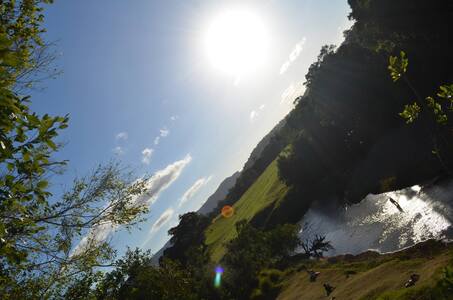2014-11-28 11:09:13 +1100
To: The Queensland Government
Save Mimburi from being sold by the Queensland Government

‘Mimburi’ is 400 acres of Sacred Kabi ‘Country’ that from May 2012 – May 2015 was in the custodianship of Mimburi Upper Mary Aboriginal Association.
Following the cancellation of the Mary Valley’s Traveston Crossing Dam proposal in 2009, approximately 13,000 hectares of land remained in the ownership of the government. The government made a commitment to return these assets to private ownership, while revitalising the Mary Valley economy and restoring stability across community. This was to be achieved specifically through the Queensland government’s Mary Valley Economic Development Strategy.
The strategy’s task was to maximise opportunities for economic development in the Mary Valley region through the engagement and support of community, to create jobs and productive enterprises.
This particular parcel of land, now better known as Mimburi was earmarked for Indigenous Land Use due to its HIGH Cultural and Environmental Significance.
The association over the period of 3 years faced the challenge of successfully securing tenure of ‘Mimburi’ through the pressure of the changing bureaucracy of the Queensland Government and the western ways of working that dominate societal systems.
Now as Traditional Custodians of these Sacred Lands we are still facing the challenging of saving this space for our families, the flora & fauna, our community and our culture
Mimburi means continual flow in our language, not just of a river, but of all living things. Mimburi also means the continual life cycle of specific creature in our landscape, most importantly the Lung Fish, Mary River Cod and Turtles. In our work we are active in acknowledging and respecting our Lore of Mimburi which requires us to treasure, respect and protect these ancients.
Mimburi is a site of unseen power; a place where both songlines and rivers meet with many communities.
The land and space of Mimburi enables greater cultural awareness and the building of positive relationships as its power lies within the country as much as it does in its gathering of peoples. It has been a meeting and dreaming place for centuries; and this tradition continues with the annual Bunya Dreaming on Mimburi’s banks of the Mary River, along with many other gatherings and spaces through the sharing of culture, caring for Country, along with the repatriation of Traditional families and practices to the land and the welcoming of visitors to our region.
We are proud of our achievements since the Association and our family as Traditional Custodians took up this land 3years ago under lease arrangements with the Queensland Government, after the success in stopping the Traveston Dam from going ahead.
However we are now at a great loss as the Queensland Government does not respect or see the value in the benefits of such a space to Culture, Community and Environment and are only seeking ‘Economic Value’ and as such have now moved the Association off the land and put the ‘property’ of Mimburi on the market for SALE at approximately $1.3 million of which the Association and our family simply do not have.
We are not in a position to purchase our Sacred Traditional homeland off the government and consequently all our hard work in cultural, environmental, social and health development for our community on the Sunshine Coast will have been for naught..
Mimburi is rare, unique and magical community, cultural and environmental space that is guided by Traditional Custodians, cultural values and cultural ways working, this has enabled the development of many positive relationships and partnerships.. Mimburi is a place for all people, from all diversity, to share, connect, and heal, to grow stronger in Spirit as Community together.
Please show your support and send the clear message to the Queensland Government that integrity, the honouring of agreements and the importance of Mimburi’s continuing existence is for the benefit of all Australians.
Following the cancellation of the Mary Valley’s Traveston Crossing Dam proposal in 2009, approximately 13,000 hectares of land remained in the ownership of the government. The government made a commitment to return these assets to private ownership, while revitalising the Mary Valley economy and restoring stability across community. This was to be achieved specifically through the Queensland government’s Mary Valley Economic Development Strategy.
The strategy’s task was to maximise opportunities for economic development in the Mary Valley region through the engagement and support of community, to create jobs and productive enterprises.
This particular parcel of land, now better known as Mimburi was earmarked for Indigenous Land Use due to its HIGH Cultural and Environmental Significance.
The association over the period of 3 years faced the challenge of successfully securing tenure of ‘Mimburi’ through the pressure of the changing bureaucracy of the Queensland Government and the western ways of working that dominate societal systems.
Now as Traditional Custodians of these Sacred Lands we are still facing the challenging of saving this space for our families, the flora & fauna, our community and our culture
Mimburi means continual flow in our language, not just of a river, but of all living things. Mimburi also means the continual life cycle of specific creature in our landscape, most importantly the Lung Fish, Mary River Cod and Turtles. In our work we are active in acknowledging and respecting our Lore of Mimburi which requires us to treasure, respect and protect these ancients.
Mimburi is a site of unseen power; a place where both songlines and rivers meet with many communities.
The land and space of Mimburi enables greater cultural awareness and the building of positive relationships as its power lies within the country as much as it does in its gathering of peoples. It has been a meeting and dreaming place for centuries; and this tradition continues with the annual Bunya Dreaming on Mimburi’s banks of the Mary River, along with many other gatherings and spaces through the sharing of culture, caring for Country, along with the repatriation of Traditional families and practices to the land and the welcoming of visitors to our region.
We are proud of our achievements since the Association and our family as Traditional Custodians took up this land 3years ago under lease arrangements with the Queensland Government, after the success in stopping the Traveston Dam from going ahead.
However we are now at a great loss as the Queensland Government does not respect or see the value in the benefits of such a space to Culture, Community and Environment and are only seeking ‘Economic Value’ and as such have now moved the Association off the land and put the ‘property’ of Mimburi on the market for SALE at approximately $1.3 million of which the Association and our family simply do not have.
We are not in a position to purchase our Sacred Traditional homeland off the government and consequently all our hard work in cultural, environmental, social and health development for our community on the Sunshine Coast will have been for naught..
Mimburi is rare, unique and magical community, cultural and environmental space that is guided by Traditional Custodians, cultural values and cultural ways working, this has enabled the development of many positive relationships and partnerships.. Mimburi is a place for all people, from all diversity, to share, connect, and heal, to grow stronger in Spirit as Community together.
Please show your support and send the clear message to the Queensland Government that integrity, the honouring of agreements and the importance of Mimburi’s continuing existence is for the benefit of all Australians.
Why is this important?
Mimburi models and teaches Indigenous cultural understandings. It is a land that builds partnerships between humans and the natural world through traditional art and cultural practices. Mimburi is an Aboriginal learning and healing place; a place whose flow reflects the confluence of the rivers, traditional Indigenous crafts and agricultural practices, and cross-cultural exchange.
